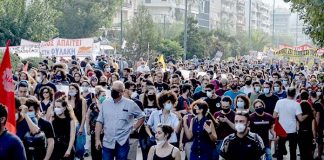Officials from the Troika have returned to Greece to resume the enforcement of austerity measures agreed as part of the new Memorandum agreed by the Syriza government.
The Troika of institutions the IMF, European Central Bank and the EU are imposing strict supervision of government decisions as the bailout deal is finalized over the next few months.
A 10 per cent increase in VAT, the Greek GST, is already in force. In total there are $20 billion in new cuts and tax increases plus $75 billion in privatisations.
Manolis Spathis, journalist on the Greek socialist newspaper Workers Solidarity, talked to Solidarity about the speed of the radical left Syriza government’s capitulation:
“In February just after the election of Syriza when the negotiations were taking place there were rallies outside the parliament which were supporting the Greek government in the negotiations, and encouraging them not to capitulate.
“Back then you could see Alexis Tsipras tweeting pictures of the rallies when he was in the negotiations, implying the bond between Syriza and the movement.
“Six months after that the situation is quite the opposite. Syriza’s leadership is using riot police to protect the parliament from the working class masses when they are voting for austerity agreements.”
Syriza divided
The decision to agree to the new austerity deal has divided Syriza. Up to 39 Left Platform and other MPs inside the party have voted against the deal in parliament.
Tsipras has launched a witch-hunt against the left, saying they threatened to bring down the left government and insisting it was better to have Syriza implementing the deal than a government of the right.
At an emergency meeting of Syriza’s Central Committee Tsipras managed to win a vote for postponing a special party conference until September, after the austerity deal has been finalised.
Their commitment to fighting inside Syriza means the Left Platform is unwilling to build opposition to the new austerity deal outside parliament.
Left Platform leader Panagiotis Lafazanis, after voting against the government in parliament, told the media, “Everything went fine. Syriza is united with its differences.”
But workers and the revolutionary left have already begun the fight to stop implementation of the new austerity measures.
As Manolis Spathis told Solidarity, “Very quickly the majority of the working class has shifted from trusting Tsipras to trusting more traditional struggles and strikes, which we’ve been doing all the time for the first five or six years.
“People are still supporting Syriza but in their trade unions have decided to resist the implementation of the agreement which Syriza brought. We’ve seen big strikes in the past couple of weeks, including a strike called by the confederation of public servants [on the day austerity measures were voted through]. Some smaller unions in the private sector also followed.
“The unions that day called two demos, one strike demo in the morning, which wasn’t so massive, and one in the afternoon during the vote which was massive, more than 50,000 people.
“The cleaning ladies of the Ministry of Finance, who were in full support of Syriza before the elections and the months after, are iconic in the Greek working class movement after fighting for almost two years, and Syriza took them back to work. Now they will be fired again as a result of the agreement.
“Part of the demands of the Troika is to undo everything the left government did in its first months until the agreement.
“I remember talking to a leading figure of these cleaning ladies in that demo, she was saying she’s really confused and her mood changes rapidly, one moment she hates the government the next moment she wants to wait and see what’s going to happen.
“But she said, ‘Whatever mood I am in I know that my place is on the streets to fight for my rights’. She’s a very good example of the contradictions in the minds of the working class.
“The same day I also had the chance to speak to a guy in the Central Committee of the Syriza youth. He was furious, calling what’s happening now with the EU a coup, but not an excuse to capitulate to austerity. He wanted to build a movement to overthrow Syriza in the streets and the universities.
“The police attacked with tear gas, with riot police in every street around the central square so there wouldn’t be an easy way out.
“This is how it feels to have a left government during a crisis of capitalism—and also class struggle from the left.”





